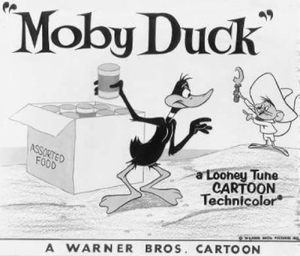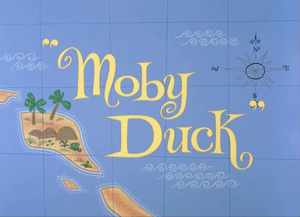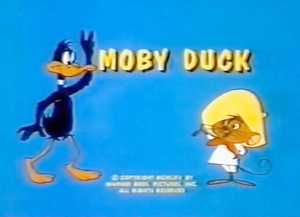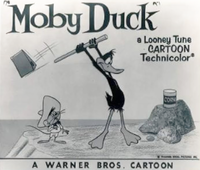Moby Duck
From Looney Tunes Wiki
Jump to navigationJump to search
| Moby Duck | |
|---|---|
 Lobby card. | |
| Production company | DePatie–Freleng Enterprises |
| Distributor | Warner Bros. Pictures |
| Release date | March 27, 1965 |
| Starring | Mel Blanc |
| Producer(s) | David H. DePatie Friz Freleng |
| Music composition | Bill Lava |
| Story | John Dunn |
| Animation | Don Williams Manny Perez Warren Batchelder Bob Matz Laverne Harding Norm McCabe |
| Director(s) | Robert McKimson |
| Series navigation | |
| ← Previous | Next → |
| Title card | |

| |
| Second title card | |

| |
Moby Duck is the four hundred and forty-sixth Looney Tunes theatrical short. It was distributed by Warner Bros. Pictures on March 27, 1965. It was written by John Dunn, produced by David H. DePatie and Friz Freleng, and directed by Robert McKimson.
Stranded on a desert island, with only a box of canned food to survive, Daffy tries everything it takes to open a can since he refuses to share with Speedy Gonzales. With Speedy only having the can opener, Daffy must choose between sharing his provisions or starving to death.
Detailed summary
Memorable quotes
Characters
In order of appearance: | ||||||||||
| ||||||||||
Locations
- Earth
- Deserted island
- Friday's Restaurant
Objects
- Axe
- Boulder
- Can opener
Production

Development
Filming
Music
The music was scored by Bill Lava.
Crew credits
- Layouts: Dick Ung
- Backgrounds: Tom O'Loughlin
- Film Editor: Lee Gunther, Treg Brown
Release
Dates are in order of release:
- United States: March 27, 1965
Behind the scenes
- The title is a pun on the 1851 novel Moby-Dick Herman Meville.
- The plot of this cartoon combines plot elements from the two previous entries directed by Friz Freleng, Canned Feud and Rabbitson Crusoe.
- However, unlike the well fed mouse who was starving Sylvester purely out of sadism back in Canned Feud, Speedy is starving and repeatedly offers to give Daffy the can opener, if he can have at least one of Daffy's cans, which the greedy duck refuses to do. Additionally, the cartoon ends differently with Speedy giving Daffy the can opener for free because he had found another source of food.
- While this the second short to pair both Daffy and Speedy together, it is first Daffy and Speedy cartoon to be directed by Robert McKimson.
- From this cartoon onward, McKimson would direct the rest of the cartoons which feature Daffy Duck and/or Speedy Gonzales — save for only two Road Runner and Wile E. Coyote cartoons, Rushing Roulette and Sugar and Spies, and one Daffy Duck/Porky Pig cartoon, Corn on the Cop, which is instead directed by Irv Spector — throughout his tenure at DePatie-Freleng, while the directing duties of the Road Runner shorts (except those two) were handed over to Rudy Larriva via Format Films.
- This was the final Warner Bros. cartoon that Treg Brown worked on as a film editor, and one of the few he worked alongside Lee Gunther.
Legacy
- Not counting It's Nice to Have a Mouse Around the House, this cartoon marks a change in Daffy's personality for his appearances with Speedy Gonzales. Daffy appears to be an extremely grouchy, nasty and bitter character, and in these cartoons, he heavily disregards others in favor of only getting what he wants. Although these traits were previously seen in Stork Naked and The Iceman Ducketh, these traits have been exaggerated in this short and made permanent throughout the rest of his appearances until the late-1960s, with a few exceptions in shorts such as Skyscraper Caper. This atagonisyic portrayal of Daffy has dropped in more recent Looney Tunes revivals since the 1970s.
- The plot of Daffy and Speedy on a desert island would again be partially used for Daffy Duck's Fantastic Island.